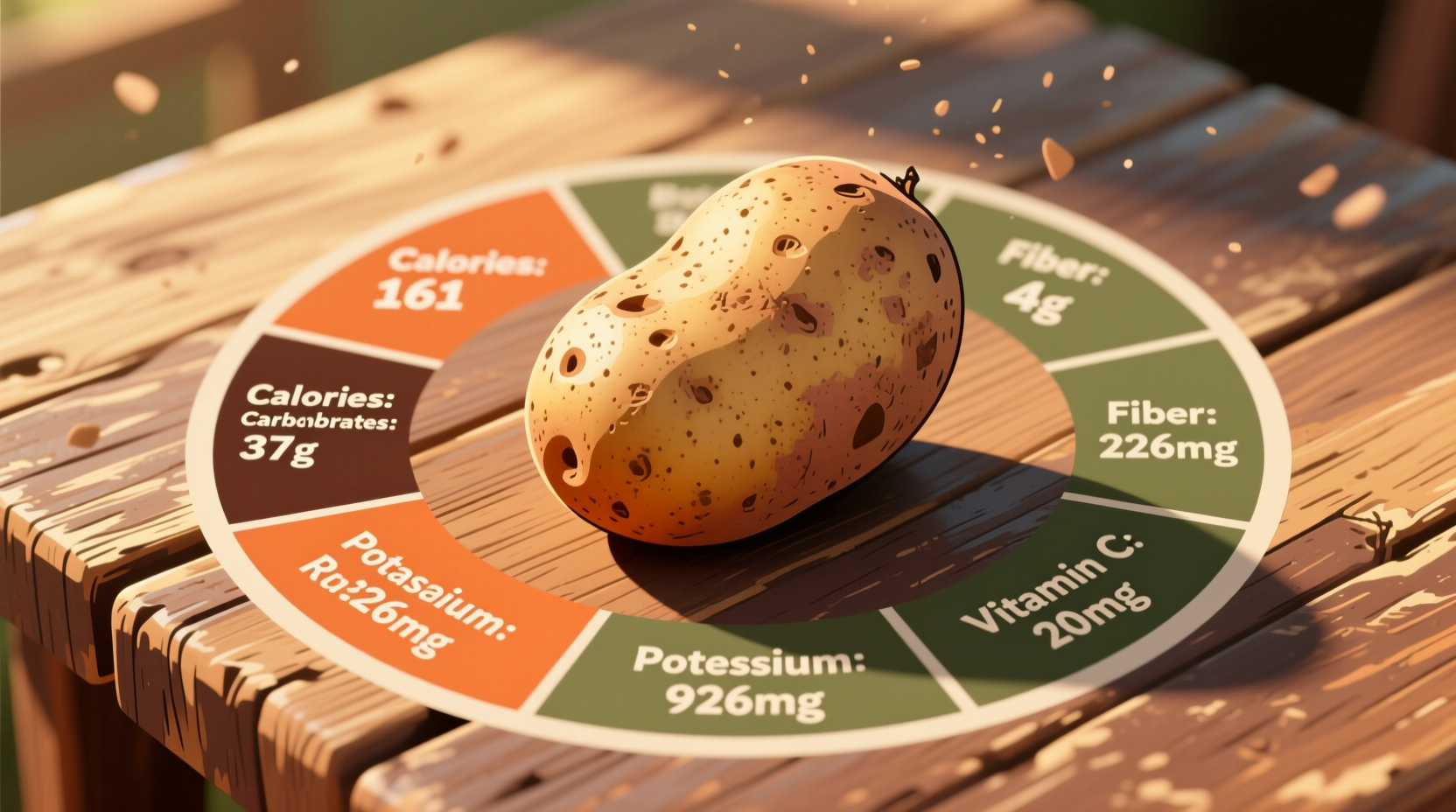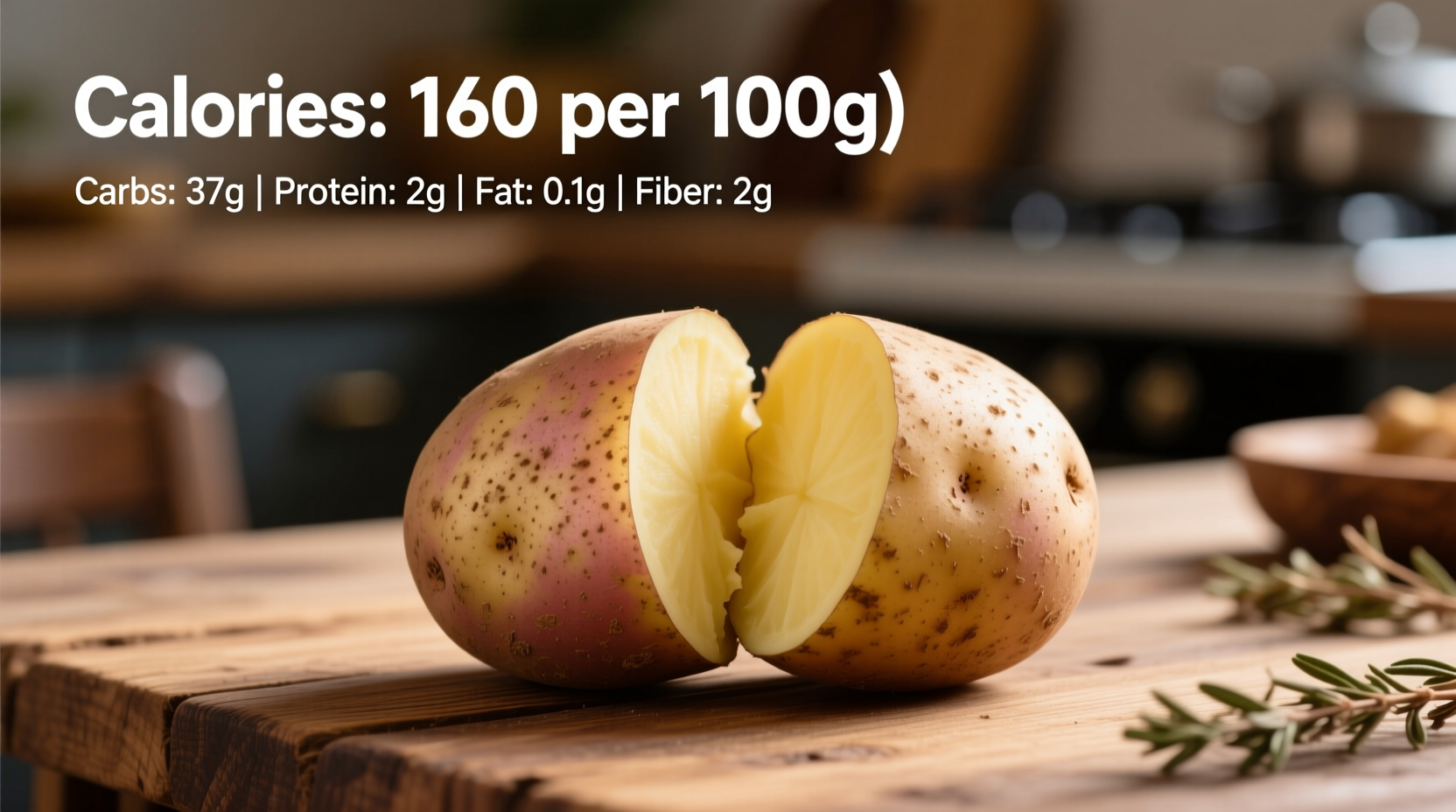Understanding the precise calorie content of russet potatoes helps you make informed dietary choices whether you're meal prepping, tracking macros, or managing specific health goals. As one of America's most popular potato varieties, russets offer versatile culinary applications while delivering essential nutrients beyond just their caloric value.
Nutritional Profile of Russet Potatoes
When evaluating calories in russet potato nutrition, it's essential to consider the complete nutritional package. According to the USDA FoodData Central database (accessed September 2025), a medium russet potato (173g) provides:
| Nutrient | Amount | % Daily Value* |
|---|---|---|
| Calories | 168 | 8% |
| Total Carbohydrates | 37g | 13% |
| Dietary Fiber | 4.6g | 16% |
| Protein | 4.3g | 9% |
| Potassium | 926mg | 20% |
| Vitamin C | 17mg | 19% |
*Percent Daily Values based on a 2,000 calorie diet. Source: USDA FoodData Central
How Preparation Method Affects Calorie Count
The calories in russet potato vary significantly based on preparation method. Many people don't realize that cooking technique dramatically impacts the final nutritional profile:
- Baked with skin: 168 calories (medium potato) - preserves maximum nutrients
- Boiled: 157 calories - slight nutrient loss to cooking water
- Mashed (no additions): 134 calories per cup - density changes affect serving size
- Fried: 319 calories per medium potato - absorbs significant oil
- Air-fried: 185 calories - moderate increase with minimal oil
This preparation timeline shows how cooking methods have evolved and their nutritional implications:
Potato Preparation Evolution Timeline
- Pre-1900s: Primarily boiled or baked - minimal processing preserves nutrients
- Early 1900s: Introduction of deep frying - significantly increases calorie density
- Mid-1900s: Rise of processed potato products (frozen fries, instant mashed) - often adds sodium and preservatives
- 2000s-Present: Health-conscious methods like air frying gain popularity - balances texture with reduced oil absorption
Comparing Russet Potatoes to Other Varieties
When tracking calories in russet potato versus other types, consider these key differences. Russets contain slightly more calories than some alternatives but offer unique culinary properties:
- Russet: 168 calories, high starch content, ideal for baking and frying
- Red potato: 150 calories, waxy texture, better for boiling and salads
- Sweet potato: 180 calories, higher vitamin A, different glycemic response
- Yukon Gold: 155 calories, buttery flavor, versatile for multiple cooking methods
Russets' higher starch content makes them excellent for fluffy baked potatoes but means they have a moderately higher glycemic index than waxy varieties. This matters for individuals monitoring blood sugar levels.

Practical Dietary Applications
Understanding the exact calories in russet potato helps you incorporate them strategically into various dietary patterns. Consider these practical applications:
For Weight Management
Russet potatoes provide substantial volume and fiber for relatively few calories, promoting satiety. A medium baked russet contains only 80 calories per 100g, making it more filling than many processed carbohydrate sources. Pair with protein sources like Greek yogurt or lean chicken to create balanced meals that support weight management goals.
For Athletic Performance
The complex carbohydrates in russet potatoes provide sustained energy release, making them excellent pre-workout fuel. Many athletes time russet potato consumption 2-3 hours before endurance activities to maximize glycogen stores. The potassium content also helps prevent muscle cramps during prolonged exercise.
For Blood Sugar Management
While russets have a moderate glycemic index (85), cooling cooked potatoes increases resistant starch content, lowering their glycemic impact by up to 25%. For individuals monitoring blood sugar, pairing russet potatoes with vinegar-based dressings or acidic components can further reduce the glycemic response.
Common Misconceptions About Potato Nutrition
Several myths persist about calories in russet potato that deserve clarification based on current nutritional science:
- Myth: Potatoes are "empty calories" with little nutritional value
Fact: Russets provide significant potassium, vitamin C, and fiber - nutrients many Americans lack - Myth: The skin contains all the nutrients
Fact: While the skin contains concentrated fiber and some nutrients, substantial nutrition exists throughout the potato - Myth: Potatoes cause weight gain
Fact: Research shows potatoes don't contribute to weight gain when prepared healthily and consumed in appropriate portions
Maximizing Nutritional Value: Practical Tips
Follow these evidence-based strategies to get the most nutritional benefit from russet potatoes while managing calorie intake:
- Cook then cool: Refrigerate cooked potatoes for 24 hours to increase resistant starch by up to 50%, improving gut health and reducing glycemic impact
- Keep the skin on: The skin contains nearly half the fiber and significant nutrients - always wash thoroughly instead of peeling
- Pair with healthy fats: Combine with olive oil or avocado to enhance absorption of fat-soluble vitamins
- Portion mindfully: A medium potato (about the size of a computer mouse) provides appropriate calories for most meal contexts
- Avoid excessive toppings: Sour cream, butter, and cheese can triple the calorie count - opt for Greek yogurt, herbs, or salsa instead
When Russet Potatoes Might Not Be Ideal
While versatile, russet potatoes have specific limitations worth noting. Understanding these context boundaries for russet potato consumption helps make informed choices:
- Kidney disease management: High potassium content may require portion control for those with impaired kidney function
- Very low-carb diets: At 37g carbohydrates per medium potato, they exceed limits for strict ketogenic approaches
- Certain digestive conditions: The resistant starch that benefits most people may cause discomfort for those with IBS
- Nightshade sensitivity: Some individuals report inflammation responses to nightshade vegetables including potatoes
For these situations, consulting with a registered dietitian can help determine appropriate potato inclusion based on individual health profiles.
Conclusion: Balancing Nutrition and Enjoyment
The calories in russet potato represent just one aspect of their nutritional profile. When prepared thoughtfully, russets offer substantial nutritional benefits beyond their caloric value. By understanding how cooking methods affect their nutritional properties and incorporating them strategically into balanced meals, you can enjoy this versatile vegetable while supporting your health goals. Remember that whole food sources like russet potatoes provide complex nutrition that isolated supplements cannot replicate.
How many calories are in a medium russet potato?
A medium russet potato (approximately 173g) contains 168 calories when baked with the skin. This serving provides 37g of carbohydrates, 4.6g of fiber, and significant amounts of potassium and vitamin C.
Do russet potatoes have more calories than other potato varieties?
Russet potatoes contain slightly more calories than some varieties. A medium russet has 168 calories compared to 150 in red potatoes and 155 in Yukon Golds. The difference comes from russets' higher starch content, which makes them ideal for baking and frying applications.
How does cooking method affect the calorie count of russet potatoes?
Cooking method significantly impacts calories. Baking preserves the natural 168 calories, boiling reduces it slightly to 157, while frying increases it dramatically to 319 calories due to oil absorption. Air frying adds minimal oil, resulting in about 185 calories for the same size potato.
Are russet potatoes good for weight loss?
Yes, when prepared healthily. Russet potatoes provide high volume and fiber for relatively few calories (80 calories per 100g), promoting satiety. The key is preparation method - baked or boiled potatoes with minimal added fats support weight management better than fried versions.
Does cooling cooked russet potatoes change their nutritional profile?
Yes, cooling cooked russet potatoes increases their resistant starch content by up to 50%. This modification improves gut health, reduces the glycemic impact by up to 25%, and provides additional calorie management benefits while maintaining the same base calorie count of 168 per medium potato.











 浙公网安备
33010002000092号
浙公网安备
33010002000092号 浙B2-20120091-4
浙B2-20120091-4